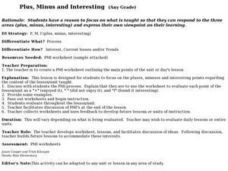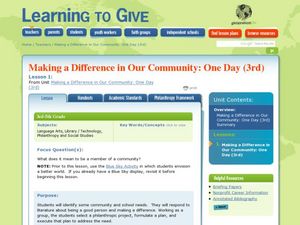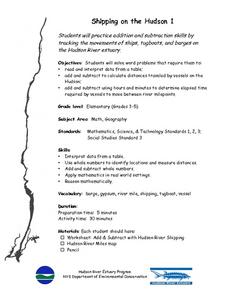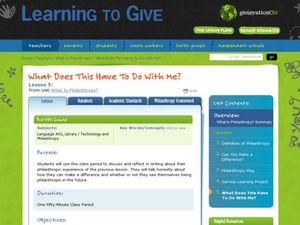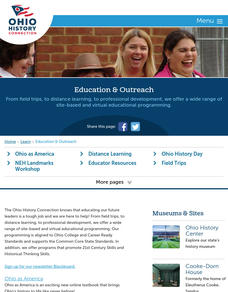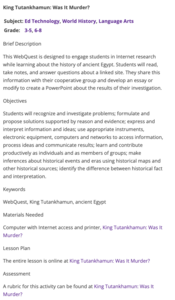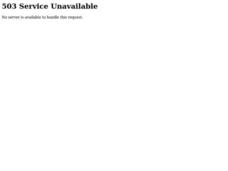Curated OER
Plus, Minus and Interesting
Students identify the main ideas or topics of a lesson or unit using the plus, minus and interesting graphic organizer. In this main idea or topic lesson, students examine the use of the PMI graphic organizer. They describe the item they...
Curated OER
One Person Makes a Difference
Students discuss how a person can make a difference. In this peace activity, students read books in literature circles about characters that made a difference. They get together in groups and discuss what it means to make a difference...
Curated OER
Making a Difference in Our Community
Students reflect on the needs of the community and of the school. In this philanthropy lesson, students work in pairs to answer the questions, "Can kids make a difference?" Students understand the importance of making a difference by...
Teaching Tolerance
Modern-Day Heroes: People Who Are Making a Difference
Not all superheroes wear capes. An engaging lesson delves into the world of modern-day heroes and activists for change. Academics learn there are many different ways to be a hero as well as explore what makes a person a hero. The...
Curated OER
People Who Have Made A Difference
Learners explore, experience, and develop a list of ways they can make a difference in their communities. They assess a matrix of attributes of people who have already made a difference in the lives around them. The class surveys a group...
Curated OER
Voting and Elections: Vote to Make a Difference
Students use a ballot to make a choice about two items to vote on. In this voting lesson plan, students discuss comparing choices between two items, the benefits and drawbacks to each, and make tally marks to total the votes.
Curated OER
May The Best Character Win
Students examine the financial committment to running a campaign. They discuss the difference between electroal and popular votes. They realize how involved a political campaign is!
Montana State University
What's the Weather?
How many jackets do you need to stay warm and climb Mount Everest? An informatie resource covers the topic of Mount Everest, the resource helps young scientists discover the difference between climate and weather. Activities include...
Curated OER
Shipping on the Hudson
Learners track movements of ships, tugboats, and barges on the Hudson River estuary in order to practice addition and subtraction skills. They solve word problems by reading and interpreting data from a table. They calculate distances...
Briscoe Center for American History
Mary Maverick and Texas History - Part 1
What's the difference between a diary and a memoir? Young historians explore the ramifications of this question as they learn how to use primary source materials to gain an understanding of life on the Texas frontier.
NASA
Geographical Influences
"If global warming is real, why is it so cold?" Distinguishing the difference between weather and climate is important when it comes to understanding our planet. In these activities, young scientists look at the climate patterns in a...
Curated OER
What Does This Have To Do With Me?
Students examine how to make a difference in their community. In this philanthropy lesson, students discuss if one person can make a difference, brainstorm a list of actions individuals can take to make a difference and write an essay...
Curated OER
Maya Math: Addition and Subtraction
Students examine how ancient Maya counted, and practice addition and subtraction using Maya number glyphs.
Curated OER
Turning the Tide on Trash: Marine Debris Curriculum
Six different lessons comprise this unit on marine debris. Science, language arts, social studies, and art projects make this an ideal interdisciplinary unit. The result will be well-informed future citizens who can help make a...
Curated OER
Lesson 1: The Importance of Rules in Our Country and in Our Classroom
Explore the importance of rules in a community with the engaging first lesson of this series on the US government. To begin, children play a paper clip game that requires them to make up their own rules as they go, after which the...
Curated OER
Lesson 4: The Judiciary: A Brief Introduction to the Courts System
Focusing on the judicial branch of government, the fourth lesson in this series explores the structure of the US courts system. Beginning with an engaging activity based on the short story The Lady or the Tiger, students go on to examine...
Learning to Give
Why Volunteer?
Inspire scholars to volunteer their time to make a positive change in their community. With help from research, a public speaker, and reflection, learners define and asses what it takes to be a volunteer in a business, non-profit,...
Learning to Give
Create a Volunteer Spirit
Motivate young citizens to make a positive difference through volunteering. Scholars examine the local and school community to discover ways the class, as a whole, can volunteer their time to help one or the other, then reflect on their...
Teaching Tolerance
Activism Online
People can make a difference in the world without leaving their homes. Using an eye-opening resource, scholars complete a handout as they consider the strengths and weaknesses of the Internet as a tool for social activism. Finally,...
Curated OER
ONE VOTE
In order to understand the political process and the importance of voting, pupils will construct a class time line. They will group up and research a specific era, creating a time line of political events where one vote made a...
Curated OER
Using Primary Source Documents
Students examine copies of primary source documents and determine the document's value to a researcher. They analyze and evaluate the document for bias or contradiction. They know the difference between a primary and secondary source.
Curated OER
What is an Initial Public Offering (IPO)?
Young scholars learn the difference between primary and secondary stock markets. Obviously, students explain that it is difficult, if not impossible, for individuals to get shares of an IPO at the offering price.
Curated OER
King Tutankhamun: Was It Murder?
Students complete a WebQuest in which they research ancient Egypt and King Tutankhamun. They determine the difference between historical fact and interpretation before using their research to develop an essay or PowerPoint.
Curated OER
Message in a Bottle
Young scholars acquire a pen pal in a foreign country and write letters at least twice a month throughout the year to exchange with them. At the end of the year, they write an essay that compares one important difference and one...
Other popular searches
- Similarities and Differences
- Differences
- Difference of Two Squares
- Culture Differences
- Difference of Squares
- Respecting Differences
- Gender Differences
- Estimating Differences
- Average Time Difference
- Cultural Difference
- Regional Differences
- Individual Differences


